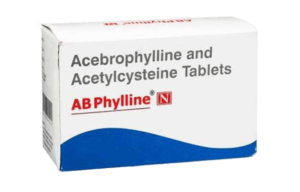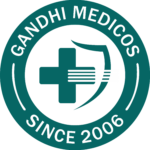What to Know About AB Phylline N Tablet?
Understanding AB Phylline N Tablet: A Comprehensive Guide
 AB Phylline N Tablet, manufactured by Sun Pharmaceutical Industries Ltd., is a prescription medication combining Acebrophylline (100mg) and Acetylcysteine (600mg). Primarily used to treat and prevent asthma and symptoms of chronic obstructive pulmonary disease (COPD), such as coughing, wheezing, and shortness of breath, it works by relaxing the muscles in the air passages, making breathing easier. This tablet is taken orally, with or without food, as directed by a healthcare professional.
AB Phylline N Tablet, manufactured by Sun Pharmaceutical Industries Ltd., is a prescription medication combining Acebrophylline (100mg) and Acetylcysteine (600mg). Primarily used to treat and prevent asthma and symptoms of chronic obstructive pulmonary disease (COPD), such as coughing, wheezing, and shortness of breath, it works by relaxing the muscles in the air passages, making breathing easier. This tablet is taken orally, with or without food, as directed by a healthcare professional.
It’s essential to adhere to the prescribed dosage and duration to ensure optimal effectiveness. Common side effects may include vomiting, heartburn, stomach upset, rash, itching, and nasal inflammation, but these usually subside over time. It’s crucial not to self-medicate or recommend the medication to others.
Before starting AB Phylline-N Tablet, inform your doctor about any existing medical conditions, especially liver or kidney disease, and if you are pregnant, planning pregnancy, or breastfeeding.
With proper usage and under medical guidance, AB Phylline N Tablet can significantly improve respiratory symptoms and enhance the quality of life for individuals with asthma and COPD.
Uses of AB Phylline N Table
- Treatment of Asthma
- Treatment of Chronic obstructive pulmonary disease (COPD)
- Treatment of Pneumonia
How AB Phylline N Tablet Works:
AB Phylline N Tablet works through a combination of its two components:
- Acebrophylline: This ingredient serves as both a mucolytic and bronchodilator. It functions by calming the muscles in the airways, which aids in easier breathing. Moreover, it helps to thin and loosen mucus, making it simpler to expel.
- Acetylcysteine: Another mucolytic agent, Acetylcysteine also aids in thinning and loosening mucus, thus assisting in its removal through coughing.
Benefits of AB Phylline N Tablet:
- Treatment of Asthma: AB Phylline-N Tablet can be particularly beneficial for individuals with asthma. By relaxing the muscles in the airways, it helps prevent asthma attacks triggered by factors such as exercise, dust, pollen, pets, and cigarette smoke.
- Treatment of COPD: For individuals with COPD, AB Phylline N Tablet offers relief from symptoms like chest tightness, shortness of breath, wheezing, and coughing. It works by keeping the airways open, making breathing easier.
- Treatment of Pneumonia: This medication is also effective in treating bacterial infections such as pneumonia. By killing the bacteria responsible for the infection, AB Phylline-N Tablet helps alleviate symptoms and promotes recovery.
Usage and Dosage:
It’s essential to follow the dosage and duration recommended by your healthcare provider when taking AB Phylline N Tablet. You can take it with or without food, ideally at the same time each day.
Side Effects:
While AB Phylline-N Tablet is generally well-tolerated, some individuals may experience side effects such as vomiting, heartburn, stomach upset, rash, itching, and nasal inflammation. If any side effects persist or cause concern, it’s important to consult a doctor.
Safety Precautions:
- Alcohol: It is advisable to avoid alcohol consumption while taking AB Phylline-N Tablet, as it may lead to excessive drowsiness.
- Pregnancy and Breastfeeding: If you are pregnant, planning pregnancy, or breastfeeding, it’s essential to consult your doctor before using this medication.
- Driving: AB Phylline N Tablet typically does not impair driving ability.
- Kidney and Liver Function: Patients with kidney or liver disease should use AB Phylline-N Tablet with caution.
What to Do If You Forget a Dose:
If a dose of AB Phylline N Tablet is missed, it should be taken as soon as possible. However, if it’s nearly time for the next dose, the missed dose should be skipped, and the regular dosing schedule resumed.
Conclusion:
In conclusion, AB Phylline N Tablet is a valuable medication for the management of asthma, COPD, and certain respiratory infections. When used as directed and under the supervision of a healthcare provider, it can significantly improve symptoms and enhance the quality of life for individuals with these conditions. As with any medication, it’s important to follow the prescribed dosage, adhere to safety precautions, and consult a doctor if any concerns arise.




 :
:  +91 – 9999064250 | 9811604444 | 9811604424
+91 – 9999064250 | 9811604444 | 9811604424

